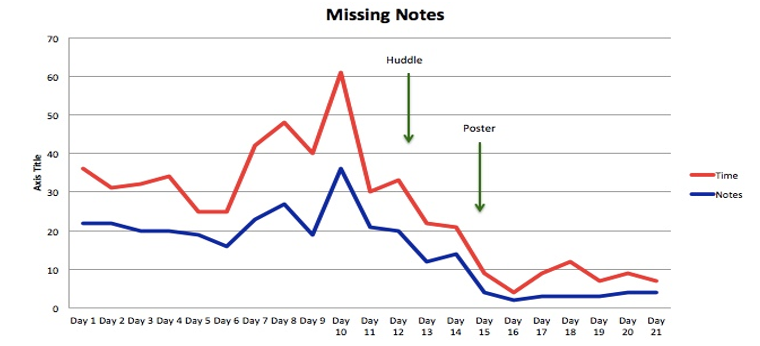Neurotic About Notes: A Quality Improvement Project to Improve Note Safety
Reducing the incidence of notes being incorrectly stored away from a secure trolley on the paediatric ward using peer champions and staff posters.
The Initial Problem and its Impact
Handwritten notes are kept in a locked trolley in a secure room to preserve confidentiality. With multiple teams, it was unusual to find notes in the correct slot of the trolley. Numerous inefficiencies occurred through time spent looking, an inability to record notes contemporaneously and the risk of mistreating patients due to absent information.
Over a two week period 291 sets of notes were missing, at an average of 21 per day. Time spent looking for notes equaled 13.5 minutes per ward round. 80% of staff surveyed spent at least 5 minutes a day looking for notes, equaling 10 hours per week or 22 days per year.
The lower end estimate of the cost involved spent looking for notes equaled £10,000 annually.
Causes of the Problem
Discussion groups with paediatric staff were held to understand the behavioural aspect of this problem, however no single factor stood out. Conflicting schedules, lack of time, lack of access to the secure room and a perception it was easier to leave notes on a desktop were some of the issues raised.
Crucially most staff had not appreciated the safety aspect of leaving notes out. Specialty teams were the outliers without a vested interest in changing practice and little direct understanding of the knock on effect that mislaid notes were causing to their own ward rounds, and theatre timings.
Project Aim Statement
To reduce the incidence of notes incorrectly stored away from the secure trolley on the ward by 75% within one month.
Stakeholders
The team was headed up by myself, a FY 2 doctor, and Dr Gabbie, Paediatric consultant. A senior sister acted as a nurse champion. Focus group were held to problem solve, generate enthusiasm for change and empower staff. Flash workshops involving doctors, ward matron, senior sister, representatives of CAHMs and Eating Disorder Team and nursing staff were held to educate staff, understand any issues arising since the start of the project and to empower staff in challenging teams to engage and appreciate the extent of the problem.
PDSA Cycles / Solution(s) Tested
PDSA Cycle one – Nurse and Medical Champion appointed / Outlined problem in daily huddle.
PDSA Cycle two – Poster displayed at key points throughout the ward to highlight the underlying problem and our objectives.
Data Results

Pre intervention on average 21 notes were missing a day, 13.5 minutes per ward round were spent looking and in total 291 sets of notes were incorrectly stored in those two weeks.
Following our intervention on average only 1 set of notes went missing per day and time lost on ward round dropped to 5.5 minutes.
No further patient notes were lost.
The ward round concluded earlier, allowing more capacity to finish tasks, with earlier discharge, better flow and fewer patient complications.
How This Improvement Will Be Sustained
The improvements were maintained when invested members of team are on the ward and able to directly champion the cause.
Slips occurred at Doctor changeover periods, and when the appointed champions were on annual leave or their rota took them away from ward duties.
Efforts were made to try and counter this by continuing to raise the issue at safety huddle especially at changeover times and to include it in the new doctor paediatric induction programme.
Continuity through appointment of additional champions aimed to keep this at the forefront of our day to day activity.
Challenges and Learnings
The biggest obstacle was changing people’s mindset. This required positive senior level input but also buy in from the junior level up to effectively influence attitudes. Leading by example emboldened our team and gave us the positive results we achieved.
Performance dipped after the cohort of doctors changed over, reflecting the need for new champions prior to the handover and ongoing focus immediately after.
Senior support and strong leadership is vital in influencing outliers and empowering staff to challenge the behaviour of those without a direct engagement.
Persistence, a team approach, and project champions are key.
Suggestions for Further Implementation
This project could be focused on a more detailed analysis of the time wasted spent looking for, and dealing with the outcomes as a result of missing notes.
If we expanded this project across the whole of the trust it would offer an invaluable insight into unseen financial losses and provide impetus to focus our work methods in a way that would generate significant quality improvement across the hospital.
This could be used to demonstrate a need and financial benefit of increasing administration staff and ward support within certain areas of the trust”
Project Lead: Dr Oliver Blackford
Organisation: Croydon University Hospital
Published: May 2019
